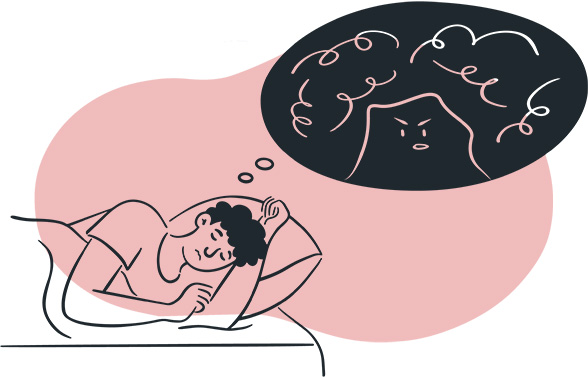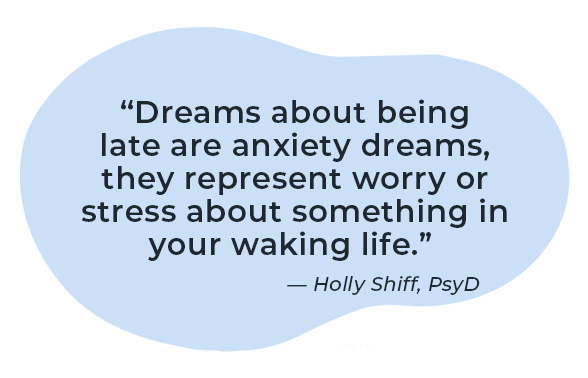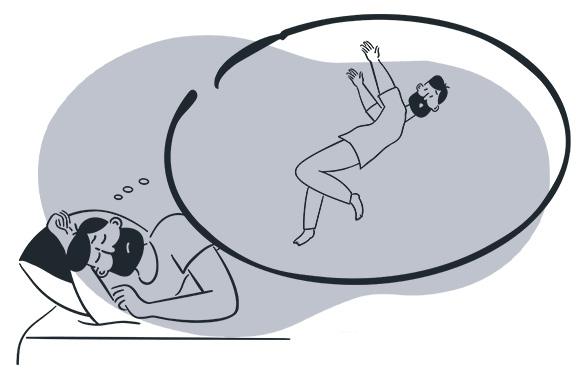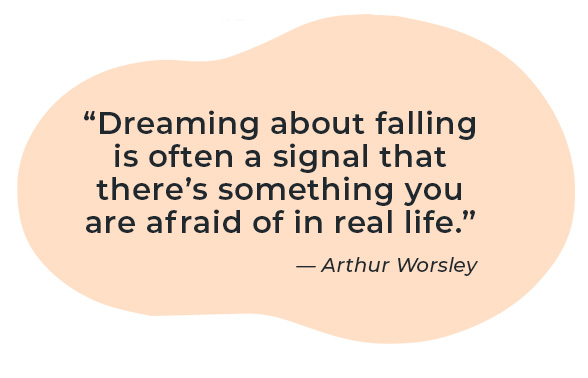Everything You Need To Know About Nightmares
Disclosure: By clicking on the product links in this article, Mattress Nerd may receive a commission fee at no cost to you, the reader. Read full disclosure statement.
What are nightmares, why do they happen, and how can you limit their likelihood?
Anywhere from 1 to 7 percent of adults experience nightmares on a weekly basis, according to a 2010 study. And while they cause no physical pain, nightmares can have a serious effect on your mental and emotional health if they happen frequently or are particularly intense—even if you’ve long outgrown your fear of monsters under the bed.
In this piece, we’ll discuss what nightmares are, what causes them, and how you can manage them so you can get a good night’s sleep.

What is a Nightmare?
Nightmares are dreams that cause us to wake up from sleep feeling scared, anxious, or panicked. Unlike regular bad dreams that we might just sleep through, nightmares are more vivid and emotional. These feelings can be very intense and linger after you’ve awoken.
Symptoms of nightmares include:
- seeing vivid and upsetting images unfold
- a storyline that revolves around safety or survival
- being awoken from sleep
- feeling scared, sad, or disgusted after you wake up
- anxiety
- sweating
- pounding heartbeat
- being able to recall details of the dream
- trouble falling back asleep
Nightmare Disorder vs. Night Terrors
Believe it or not, there’s an even more terrifying level of bad dreams that go beyond your scariest nightmare. They’re called night terrors, and unlike nightmares, they cause the sleeper to move their body and display other physical signs of panic like flailing their arms, kicking their legs, and even screaming.
Nightmares are far more common than night terrors. Nightmares happen to 35 to 45 percent of adults at least once a month, while night terrors happen once or twice during adulthood for only 1 to 2 percent of the population. And while both don’t require any interference if they happen occasionally, therapy can help uncover any emotional triggers if they happen frequently or are severely impairing.

5 Most Common Nightmares and Their Meanings
Understandably, most people want to know why they’re having nightmares about certain things—especially when those nightmares keep repeating.
While science hasn’t confirmed that good or bad dreams hold any deeper meaning, some people believe that nightmares are symbolic or a reflection of what we’re going through in life.
Here are the top five most common nightmares and what they might mean:
- Falling: feeling anxious, betrayed, out of control, or unsupported.
- Being chased: feeling anxious, having ongoing or heightened stress about an upcoming event, or avoidance.
- Drowning: overwhelmed, unmanageable circumstances, emotional burdens, or struggling to feel like yourself.
- Natural disasters: emotional or physical upheaval, or experiencing big, sudden changes.
- Being attacked: experiencing or avoiding conflict.
When it comes to specific themes, there are some experts weighing in with hypotheses. Lauri Quinn Loewenberg, Professional Dream Analyst, says of being chased in a dream, “This dream is caused by avoidance or procrastination… or trying to distance yourself from an unsettling past. When you start facing the past, when you start confronting who or what bothers you, the dreams stop.”
“Dreams, no matter how seemingly strange or zany, are like precious letters meant specifically for you,” says Certified Dreamwork Professional, Tzivia Gover, MFA. “That dream you had last night about falling from the balcony of an alpine retreat, was actually tailor-made for you using a blend of your own memory, emotion, and intuitive wisdom, and knowledge.”
Arthur Worsley, MA in Psychology from Oxford University also has hypotheses on the theme of falling in dreams. He says, “Dreaming about falling is often a signal that there’s something you are afraid of in real life. This fear is mostly connected to failing at something you’re doing or pursuing.”
When it comes to the all-too-common dreams of running late to something, Clinical Psychologist Holly Schiff says, “Dreams about being late are anxiety dreams, they represent worry or stress about something in your waking life. Perhaps you feel a step behind, or like you are missing an opportunity, or perhaps a sign or indicator.”
While all dreams are open to interpretation (and there is no singular meaning for every kind of nightmare), noticing what patterns or themes emerge in your nightmares can give you some insight into what might be going on in your life.
No matter what the theme of the nightmare may be, it could have a root cause of anxiety. Finding ways to address your fears and worries, especially with a professional, could prove helpful.

Most Common Causes of Nightmares
While everyone experiences the occasional nightmare—and it’s no cause for concern—frequent nightmares can mess with our sleep and even be a sign of a rare nightmare disorder. Unfortunately, science still has yet to determine what causes nightmares. But certain things can trigger them, including:
- sleep deprivation
- stress or anxiety
- use of certain medications
- substance abuse
- post-traumatic stress disorder (PTSD)
- watching scary movies or reading scary books (especially before bed)
Not being able to fall back asleep after a particularly terrible dream can cause sleep deprivation, which leads to a host of other problems like daytime fatigue, moodiness, irritability, and difficulty concentrating. If your nightmares happen often or to a point that they’re causing you major distress, impairment, or anxiety during the day, talk with your doctor.
Tips on How to Stop Having Nightmares
You can’t eliminate nightmares completely, but there are things you can do to ease them:
- Exercise: Getting regular exercise can help reduce stress and anxiety.
- Diet: Eating a diet full of nutrients may improve your overall sleep quality.
- Journaling: Processing difficult emotions by writing them down can help you work through them so they don’t show up in your dreams.
- Meditation: Practicing presence daily can reduce your stress levels.
- Therapy: If nightmares are severely impacting your life, therapy can help you understand and work through the emotions that may be causing them.

FAQs
What do nightmares mean?
Most nightmares are not a sign of anything deeper. But recurring or frequent nightmares could be a sign of stress or anxiety. Some dreams may be a reflection of your current anxieties or experiences in life.
Do nightmares come true?
No—nightmares are not prophetic. If they have any meaning at all, they are symbolic of our anxieties and fears.
Can nightmares cause trauma?
There’s no evidence that nightmares cause trauma. But nightmares can be a symptom of PTSD.
How do you stop nightmares?
There’s no surefire way to stop nightmares. But regular physical activity, good nutrition, meditation, journaling, and therapy can reduce stress and potentially limit how often you experience them.
What is the difference between nightmares and night terrors?
Nightmares cause you to wake up from the dream. Night terrors cause you to physically move or scream during the dream.
What causes nightmares in adults?
It’s unclear what exactly causes nightmares, but things like sleep deprivation, stress, anxiety, and certain medications could potentially trigger them.
What are foods that cause nightmares?
More research needs to be done, but one study found that dairy, spicy, meat-heavy, or sugary foods could contribute to the development of disturbing dreams.
Final Thoughts
Nightmares are an unfortunate, but normal part of life. They’re not premonitions of the future or a sign of something deeper. Improving your overall health by getting regular exercise, eating a nutritious diet, and practicing meditation can help reduce nightmares. But if they’re severely impacting your life, talk with your doctor about other ways you can manage them.
Sources
Cleveland Clinic. Sleep Deprivation. https://my.clevelandclinic.org/health/diseases/23970-sleep-deprivation
Fleetham J, et al. (2014). Parasomnias. https://www.ncbi.nlm.nih.gov/pmc/articles/PMC4016090
Li SX, et al. (2010). Prevalence and Correlates of Frequent Nightmares: A Community-Based 2-Phase Study. https://www.ncbi.nlm.nih.gov/pmc/articles/PMC2880244
Mayo Clinic. (2022). Nightmare disorder: Symptoms & causes. https://www.mayoclinic.org/diseases-conditions/nightmare-disorder/symptoms-causes/syc-20353515
Nielsen T, et al. (2015). Dreams of the Rarebit Fiend: Food and diet as instigators of bizarre and disturbing dreams. https://www.frontiersin.org/articles/10.3389/fpsyg.2015.00047/full
Sandman N, et al. (2015). Nightmares: Risk Factors Among the Finnish General Adult Population. https://www.ncbi.nlm.nih.gov/pmc/articles/PMC4355890
Stanford Medicine. (2022). Nightmares. https://stanfordhealthcare.org/medical-conditions/sleep/nighttime-sleep-behaviors/nightmares.html
St-Onge MP, et al. (2016). Effects of Diet on Sleep Quality. https://www.ncbi.nlm.nih.gov/pmc/articles/PMC5015038